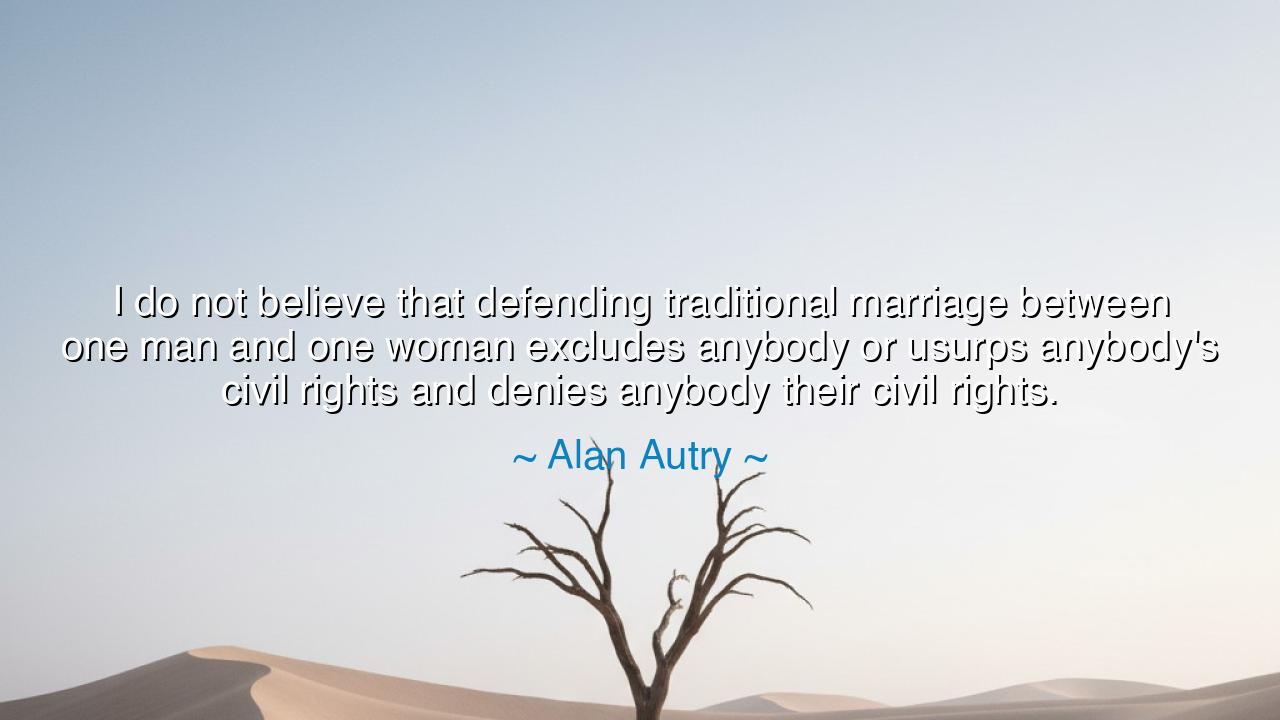
I do not believe that defending traditional marriage between one
I do not believe that defending traditional marriage between one man and one woman excludes anybody or usurps anybody's civil rights and denies anybody their civil rights.






In the grand history of human civilization, few issues have been as divisive as the concept of marriage. The words of Alan Autry—"I do not believe that defending traditional marriage between one man and one woman excludes anybody or usurps anybody's civil rights and denies anybody their civil rights"—reflect a belief deeply rooted in the tension between tradition and the call for progressive change. These words echo a sentiment that has been central to debates throughout history: the struggle between preserving traditional values and the expansion of rights to include all members of society, regardless of their identity or orientation.
In the ancient world, the institution of marriage was often viewed as a sacred contract not only between individuals but between families, tribes, and even nations. Ancient Greek and Roman societies had very specific norms about what marriage was and should be. The concept of traditional marriage, as it was understood in many cultures, was not merely about love or companionship, but about procreation, the continuity of lineage, and the stability of the state. Yet, even in these rigid systems, there were those who sought to challenge the traditional structures of society, demanding that love and human dignity be prioritized over rigid societal expectations.
Plato, in his Republic, spoke of a more egalitarian and just society, where all citizens would be treated with fairness, regardless of their gender or familial status. In this ideal society, marriage would be seen as a union of individuals based on love and mutual respect, not just a tool of political or social control. Socrates also argued for the fundamental equality of all individuals, asserting that the soul does not know gender or societal labels. Their teachings, though not focused directly on the modern concept of marriage equality, laid the groundwork for the idea that human rights and personal freedoms should be respected, irrespective of traditional structures.
History offers us countless examples of when tradition has been questioned in the name of equality. One such example is the fight for women’s suffrage. Women were once seen as incapable of full participation in public life, including the right to marry and to have their marriages legally recognized in the same way as men’s. It took years of struggle, led by women like Susan B. Anthony and Elizabeth Cady Stanton, to break down the barriers that excluded them from the fundamental rights enjoyed by men. Their efforts were met with fierce opposition, much like the opposition to marriage equality for same-sex couples. Yet, the right to vote, and the right to marry, were both civil rights that should not have been restricted based on the traditional and limited views of gender or social roles.
The struggle for same-sex marriage is another chapter in this long history of challenging traditional notions of marriage. Autry's belief that defending traditional marriage does not exclude anyone or usurp their civil rights fails to account for the reality that, throughout history, many have been excluded from the privileges that others take for granted. When we deny some individuals the right to marry the person they love, based on the gender of their partner, we are, in effect, perpetuating a form of exclusion that denies them equal rights. To claim that marriage should only be between a man and a woman excludes the millions of same-sex couples who long for the legal recognition of their love and commitment.
In this light, the words of Autry must be examined through a broader lens. The very act of defining marriage based on rigid traditions often results in the denial of rights for those who fall outside these predefined structures. Throughout history, traditions that once seemed sacred have been reevaluated in light of the values of equality and justice. We have seen this shift in areas such as the abolition of slavery, women's rights, and the fight for LGBTQ+ rights. Each of these movements has demanded that society rethink its traditional boundaries to ensure that no one is excluded from the fundamental rights that all human beings should enjoy.
The lesson here is simple yet profound: tradition should not be used as an excuse to deny rights or to exclude certain people from the privileges others enjoy. Equality is not a revolutionary ideal; it is the very basis of a just society. Marriage, in all its forms, should be celebrated as a union of love and commitment, not confined by the outdated boundaries of tradition. To move forward as a society, we must remember that the right to love and the right to marry are fundamental human rights, and these should not be restricted based on tradition, gender, or sexual orientation.
In your own life, reflect on how you can contribute to the creation of a world where equality is at the heart of all relationships. Whether in marriage, work, or society, strive to honor the dignity and rights of others, regardless of their differences. The struggle for marriage equality, much like the fight for civil rights throughout history, is ultimately a struggle for the freedom to live and love without restriction. Just as we’ve fought for the right of women to vote and the freedom of enslaved people, we must continue to fight for a society where love and commitment are recognized and celebrated, regardless of the form they take. Justice and equality are not merely ideals to strive for—they are the very heart of what makes us human.






AAdministratorAdministrator
Welcome, honored guests. Please leave a comment, we will respond soon